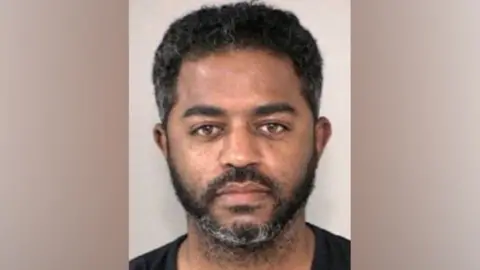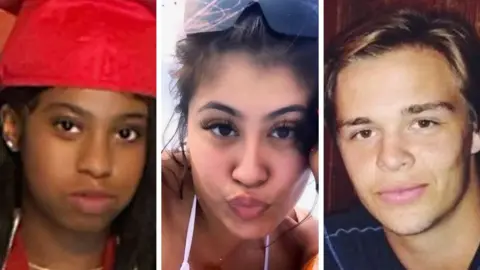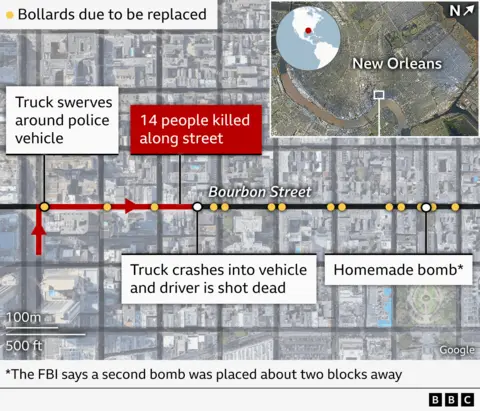 FBI
FBIFourteen people were killed and at least 35 injured after a man apparently inspired by the Islamic State group (IS) drove into large crowds in New Orleans, Louisiana, in the early hours of New Year’s Day.
Here’s what we know so far about what happened and the perpetrator.
How did the attack unfold?
At 03:15 local time on New Year’s Day, a pick-up truck rammed into crowds gathered on Bourbon Street in the heart of New Orleans’ French Quarter.
CCTV footage shows a white, Ford F-150 Lightning vehicle driving on to the pavement to get around a police car before hitting pedestrians.
Police described the act as “very intentional”, adding that the attacker – identified as Shamsud-Din Jabbar – was “hell-bent on creating the carnage and the damage that he did”.
“This man was trying to run over as many people as he possibly could,” said New Orleans Police Chief Anne Kirkpatrick.
Jabbar was also armed and fired on law enforcement, injuring two officers. He was then killed by police gunfire.
Whit Davis, from Shreveport, Louisiana, told the BBC that he was held in a bar with a large group in the aftermath of the attack while police secured the scene.
When they left, they “were walking past dead and injured bodies all over the street”, he said.
Who was Shamsud-Din Jabbar?
The FBI said Jabbar, 42, was an Army veteran and US citizen from Texas.
The pick-up truck he was driving during the attack was electric and is believed to have been rented in the state via an app called Turo.
According to a now-removed LinkedIn profile, Jabbar worked in various roles in the US Army, including in human resources and IT, before he was discharged. He was deployed to Afghanistan from February 2009 to January 2010.
In a YouTube video posted in 2020, Jabbar said his time in the military had taught him “the meaning of great service and what it means to be responsive and take everything seriously, dotting i’s and crossing t’s to make sure that things go off without a hitch”.
More on the New Orleans attack
He studied at Georgia State University from 2015 to 2017, graduating with a degree in computer information systems.
Accountancy firm Deloitte has confirmed that Jabbar was hired by them in 2021 and he also reportedly worked for Ernst & Young.
He was married twice and has children from both relationships. His first marriage ended in 2012 and his second lasted from 2017 to 2022.
Court records relating to Jabbar’s most recent divorce point to him having experienced financial difficulties – with his monthly expenses, including child support, exceeding his income.
Separate documents reveal that his then-wife had accused him of financial mismanagement and had obtained a temporary restraining order against him.
Jabbar also appears to have worked in real estate – holding a licence that expired in 2021. He had a criminal record, relating to traffic offences and theft.
Are there other suspects?
The authorities had been looking into the possibility that Jabbar may not have acted alone, but they later clarified that they were confident he had no accomplices.
FBI deputy assistant director Christopher Raia said at a news conference on Thursday that officials wanted to be transparent with the public, and that means “unfortunately there are information we have to go back on”.
A flag associated with IS was found in the vehicle the suspect was driving and the FBI said it was investigating what affiliations Jabbar may have had with terrorist groups.
President Joe Biden said he had been briefed by the FBI, and that the suspect uploaded videos to social media “mere hours before the attack” indicating that he was inspired by IS and expressing a “desire to kill”.
A person familiar with the investigation told CBS that no foreign terrorist organisation had yet claimed responsibility for the attack.
Investigators are also looking at whether the attack in New Orleans is linked to the explosion of the vehicle outside the Trump Hotel.
Mr Raia said on Thursday that they are following “all potential leads” but at this point “there’s no definitive link” between the two incidents.
Who were the victims?

Police say it appears that the victims were mainly locals from New Orleans, even though many tourists were visiting for New Year celebrations and the Sugar Bowl – part of the American football college play-offs – which was postponed as a result of the attack.
Among the dead is former Princeton University football star Martin “Tiger” Bech, according to the college’s athletics department.
“He was a ‘Tiger’ in every way – a ferocious competitor with endless energy, a beloved teammate and a caring friend,” Bob Surace, head football coach, said in a statement.
Aspiring nurse Nikyra Cheyenne Dedeaux‘s death was confirmed by her mother, Melissa, on social media.
She told local media that the 19-year-old had snuck out with a cousin and friend, who both survived the attack.
Hubert Gauthreaux, 21, was identified in a post on Facebook shared by his former high school, which said that he was killed in a “senseless act of violence”.
Store manager and father of two Reggie Hunter, 37, was described by his cousin Shirell Robinson Jackson as “full of life”.
Ms Jackson told CBS that Reggie had been with another cousin, who was injured in the attack.
Nicole Perez worked at a deli store and was mother to a four-month-old son. Her friend and boss, Kimberly Usher Fall, said Nicole was a dedicated, smart and “good-hearted person”.
Audio-visual technician Matthew Tenedorio, 25, had a “laid-back spirit and infectious laughter” that brought joy to those around him, according to a fundraiser his family set up in his name.
Kareem Badawi, a University of Alabama student, was identified by his school. On Facebook, the university’s president Stuart Bell writes that he grieves “alongside family and friends of Kareem in their heart-breaking loss”.
Where did this happen?

Bourbon Street is a well-known nightlife and tourist hotspot that is filled with restaurants, bars and clubs with live music.
It is within New Orleans’ French Quarter, a lively area that attracts tourists and locals, especially to celebrate New Year.
It was established by the French – who colonised the state of Louisiana before the founding of the USA – in 1718. The original grid of streets designed back then is at the heart of what draws visitors to the city.
Every year, upwards of a million people flock to its famous Mardi Gras carnival and parade in the spring, famous for the strings of colourful beads worn by partygoers.
Bollard repairs
Questions have been raised about whether repairs to the city’s bollard system – introduced to block vehicles’ access in the middle of busy pedestrian streets – may have been a factor in the attack.
The vice-president of the New Orleans City Council told the BBC’s Newsday programme that the use of the short, vertical posts was part of wider efforts to try and prevent potential attacks in the wake of 9/11.
However, JP Morrell said that the system was in the process of being repaired ahead of February’s Super Bowl when the attack happened.
According to a notice on the city’s website, work to replace the old bollards on Bourbon Street with “new removable stainless-steel” ones began in November.
Authorities have not confirmed whether the intersection the truck sped through was actively under construction or said if the replacement project created a vulnerability.



